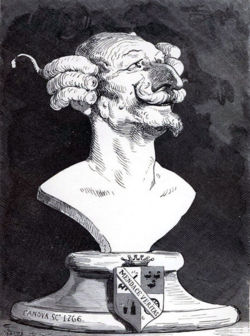Baron Munchausen: Difference between revisions
imported>D. Matt Innis (We should probably keep this lower case for consistency later) |
imported>Russell Potter |
||
| Line 8: | Line 8: | ||
==Later versions and parodies== | ==Later versions and parodies== | ||
Additions to, and parodies of, Raspé's work began almost immediately; the very year after the first London edition (1786), Gottfried August Bürger translated Raspe's tales into German, adding a few of his own. These were published as ''Wunderbare Reisen zu Wasser und zu Lande: Feldzüge und lustige Abenteuer des Freiherrn von Münchhausen'' ("Marvellous Travels | Additions to, and parodies of, Raspé's work began almost immediately; the very year after the first London edition (1786), Gottfried August Bürger translated Raspe's tales into German, adding a few of his own. These were published as ''Wunderbare Reisen zu Wasser und zu Lande: Feldzüge und lustige Abenteuer des Freiherrn von Münchhausen'' ("Marvellous Travels by Water and Land: The Campaigns and Comical Adventures of Baron Münchhausen"). | ||
==Film and animation== | ==Film and animation== | ||
Revision as of 11:16, 29 May 2007
(this article is about the fictitious character; for the "real" Baron Münchausen, see Karl Friedrich Hieronymus, Freiherr von Münchhausen).

Baron Münchausen is an enduring figure of comical exaggeration, originated by Rudolf Erich Raspé in a series of stories which were first published in the 1780's. Raspé himself may have borrowed the stories from others, and his own, regularly extended collections of stories were soon taken up and continued by later writers. Particularly in Germany and in Raspé's adopted homland of England, the stories became immensely popular, and the name of Münchausen became almost a shorthand for any form of exaggerated story or "tall tale." In the twentieth century, the Baron was featured in films and animated cartoons, most notably in Terry Gilliam's 1988 film The Adventures of Baron Münchausen. In medical literature,there exists a condition known as "Münchausen's syndrome" involves people who narrate fictional symptoms to doctors in order to obtain attention and vindication.
Raspé's Münchausen
The actual Baron Münchausen was well-known in European circles for his entertaining accounts of his military exploits, but was said to be prone to exaggeration. An anonymous version of tales under his name was published in England in 1781, and may have been a source for Raspé. Raspé's own book was entitled Baron Munchhausen's Narrative of his Marvellous Travels and Campaigns in Russia, which was reprinted with additional tales as The Surprising Adventures of Baron Munchhausen, and appeared in 1785. One of the signature touches of these texts was to reproduce an affadavit, purportedly signed by the "Lord Mayor and Aldermen" of London, averring that everything in the book was absolutely true. Raspé may have imitated this from the opening of Lucian's True History, a similarly facetious tale which was a source for many stories in the Münchausen tradition.
Later versions and parodies
Additions to, and parodies of, Raspé's work began almost immediately; the very year after the first London edition (1786), Gottfried August Bürger translated Raspe's tales into German, adding a few of his own. These were published as Wunderbare Reisen zu Wasser und zu Lande: Feldzüge und lustige Abenteuer des Freiherrn von Münchhausen ("Marvellous Travels by Water and Land: The Campaigns and Comical Adventures of Baron Münchhausen").